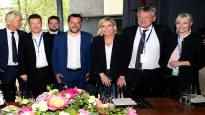Fellowship with Putin, for example, was a matter of pride for the populist parties in France and Italy before the war in Ukraine. In the EU Parliament, basic Finns belong to the same group as them, the Swedish Democrats do not – precisely because of connections with Russia.
18.3. 11:53 • Updated March 18th. 12:08
After the Russian invasion, the former prime ministers of Finland Esko Aho (center), Paavo Lipponen (sd.) and the former German demarien Chancellor (moving to another service) Gerhard Schröder have been in a public stigma for cooperating with the Putin regime.
In daily politics, the President of Russia Vladimir Putin however, has received the most sympathy and even admiration from the populist right and the National Conservatives.
However, perhaps most prominently among European party leaders, Putin has been admired by Italy’s right-wing populist Northern League, or “Legan.” Matteo Salvini.
Like Salvin, for example, the leader of the French National Front Marine Le Pen has spoken out in favor of Putin and against EU sanctions on Russia.
A new, bigger party is under construction
The ID group of national conservatives does not include the largest national conservative party in parliament, the Law and Justice leading Poland or Fidesz in Hungary.
For several years now, right-wing parties have been trying to build a new, larger group in the EU Parliament. The project has so far been unsuccessful due to disagreements, but if successful, the new group would be the third largest in Parliament.
One reason for the difficulties in forming a larger right-wing populist party may be Russia itself. A strong and united nationalist force has not been in line with Putin’s goals, as it has sought above all to break up the ranks of the West.
The formation of a common populist group could have shut down the Russian money taps of some parties, read more here.
Bite: Disloyal activity
Chairman of Basic Finns Riikka Purra emphasizes that ID group (switch to another service) when foreign policy was established, there was no common denominator. In terms of foreign policy, the Basic Finns have been on various lines with their European brother parties since the beginning.
Purra considers the promotion of Russia’s geopolitical goals to be “disloyal to the field of nationalist parties”, as Russia’s goals have directly threatened the position of its neighbors such as Finland and Estonia.
– It can be said directly that the Lega and the National Alliance have worked with Russia in dealing with Putin’s so-called as useful idiots, Purra says in her email reply to .
– It has been very ill-considered and naive for these parties to imagine that Putin’s Russia would be some kind of constructive counterweight to the phenomena of multiculturalism and mass immigration in Western Europe.
The collaboration began during Halla-aho’s term
According to Purra, the co-operation of basic Finns with Lega and the National Front is limited to working in the European Parliament.
– PS’s closest partners in the European Parliament are the Danish People’s Party, which belongs to the ID, and the Estonian Ekre, which also share the views of basic Finns in foreign and security policy, Purra says.
Member of the European Parliament Laura Huhtasaari The PS has supported all resolutions tabled by the European Parliament in this and previous parliamentary terms condemning Russia’s actions in Crimea and elsewhere in Ukraine, as well as other violations of Russia’s international law.
– At no point has the ID Group sought to form a common position on Russia, Huhtasaari writes in an e-mail.
According to Halla-aho, the support of right-wing populists is not a matter for Russia, as these parties have been on the political margin.
What attracts Putin?
Nationalists are fascinated by many things in Putin, says the populist scholar Yannick Lahti From the University of Bologna. Putin has united authoritarian and even macho-style leadership, value conservatism, emphasis on “one Russian people,” and the maintenance of strong external borders, admired by right-wing populists.
Lahti recognizes Purra’s assessment of the naivety of nationalist populists in southern Europe.
– Putin does not want a strong EU for very different reasons than Salvini, Le Pen, Geert Wilders [Hollannin äärioikeistojohtaja] or Viktor Orbán [Unkarin pääministeri]. If they had sat down to think, then the weak EU that Putin wanted was not the same as what Salvini wanted, Lahti sums up.
You can discuss the topic until 11pm on Friday.
